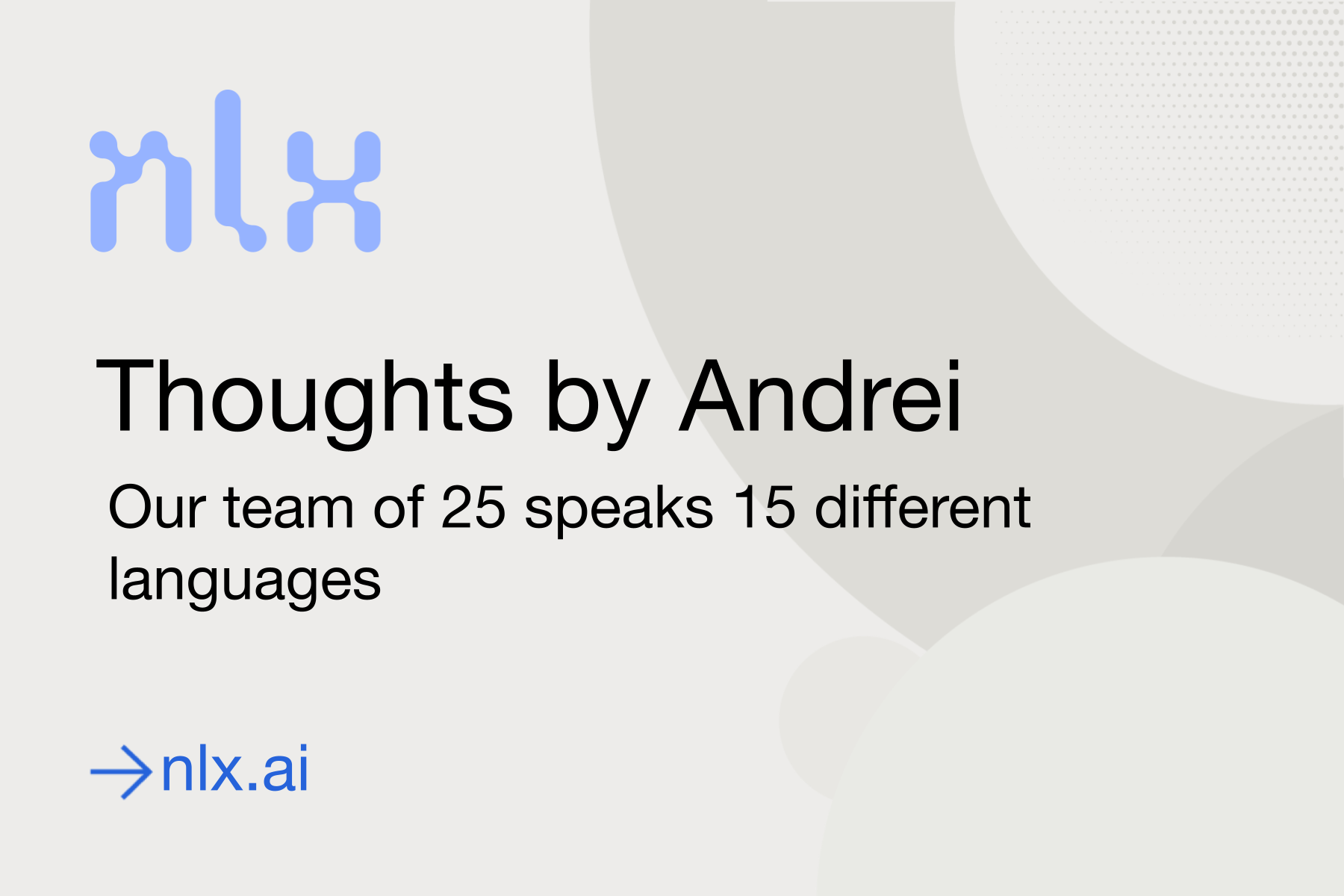Given that “conversation” is in the title of the industry NLX operates in, it might not come as a surprise that our team is enthusiastic about languages.
Our team of 25 speaks 15 languages, including Arabic (Lebanese), Belarusian, Chinese (Mandarin), English, Filipino, French, German, Hindi, Hungarian, Japanese, Korean, Nepali, Nigerian, Romanian, Russian, and Spanish.
And while this revelation of a bunch of Conversational AI people being interested or knowing several languages might not be shocking, it does pair extremely well with the technology and global customers that we work with. Let me explain…
The first point is fairly obvious - speaking more languages means we can speak with clients around the world without a language barrier. Yes, that’s a huge resource we’re grateful to be able to tap into!
But let’s go a layer deeper to an underlying but important benefit of having a highly diverse team in Conversational AI – our multilingual abilities push us to design beyond an English-centric version of the world, which Conversational AI tends to favor. We work with a broader, more global audience in mind to ensure that the solutions our technology provides for our clients are inclusive of a broader subset of their customers, the end-users.
For example, we were working with a multilingual airline, and one of our focuses when working on a solution was that the Conversational AI tools wouldn’t be able to pick up the last names of their clients due to different accents, spellings, etc. Let’s take my last Romanian name for example - Papancea, pronounced “pa-pahn-cha”. The state of the art in Speech To Text (STT) technology — what essentially transcribes voice to readable text during a spoken interaction with a voice assistant, for instance — has real difficulties with it — and it will continue to have for a long time! Even with a more common last name like “Busch”, pronounced like the shrub, “Bush”, wouldn’t be picked up due to the silent “C”. So essentially, anyone other than the John Smiths, Does, and Johnsons of the world would have a challenging time accurately communicating their last name to a voice assistant. Furthermore, capturing information like this is oftentimes critical for business processes such as changing flights, replacing credit cards, or identity verification, and the inability to capture it correctly with an AI assistant means the end-user needs to speak with a human agent.
Just because our technology can operate in 65+ different languages, doesn’t mean that it's always inclusive out of the box. Because of our team’s diverse background, heritage, and language abilities – where last names and pronunciations matter – we were able to innovate beyond the technology of today and patent a more inclusive solution for our clients to capture the different spellings and accents of their customers’ last names.
Backtracking a bit, yes - our technology does work in 65+ different languages. That also means our non-English-centric team is able to think beyond a 1:1 language interaction and develop a solution for a 3:1 language interactions or more. For example, another client we’re working with has a global audience that speaks a variety of different languages, but a central call center that’s monolingual. Our team expanded our product capabilities to effortlessly flex between languages so that customers can be easily connected with agents in the event of an escalation, despite a language barrier.
Furthermore, with our small, multilingual team, not only is our technology more inclusive, but the content in our conversation flows is more relevant. In an industry where content is key to a good automated self-service experience, our language abilities and knowledge of dialect nuances are essential to building a better customer self-service experience.
Now sure, it would be easy to say, “Andrei, walk things back for a minute… Your entire cofounding team falls into the typical tech startup cliché of all white males”. And I’d respond with“well, I can’t change my heritage, or my brother’s, or our childhood friend’s”, but what we as co-founders did focus on as we were growing the company was hiring people with different backgrounds than us… People who come with different experiences, have interesting and varied opinions, and who match our values.
It’s never too early to start thinking about Diversity, Equity, Inclusion, and Belonging (DEIB) for your organization. Because it was a priority for us from the start, our team is more innovative, more inclusive, and more adept at avoiding errors.
In this post alone, I’ve cited how just one facet of our diverse team – multiple languages – has benefited our company and company culture, while also resulting in more inclusive solutions for our customers. I could go on forever about the importance and different aspects of DEIB, and I probably will at a later date, but for now, I’ll end with a note of formal gratitude in all the different languages our team speaks.

Our team of 25 speaks 15 different languages
NLX's team of 25 speaks 15 languages. CEO & CPO Andrei Papancea explains how it impacts our products, culture, and customers.